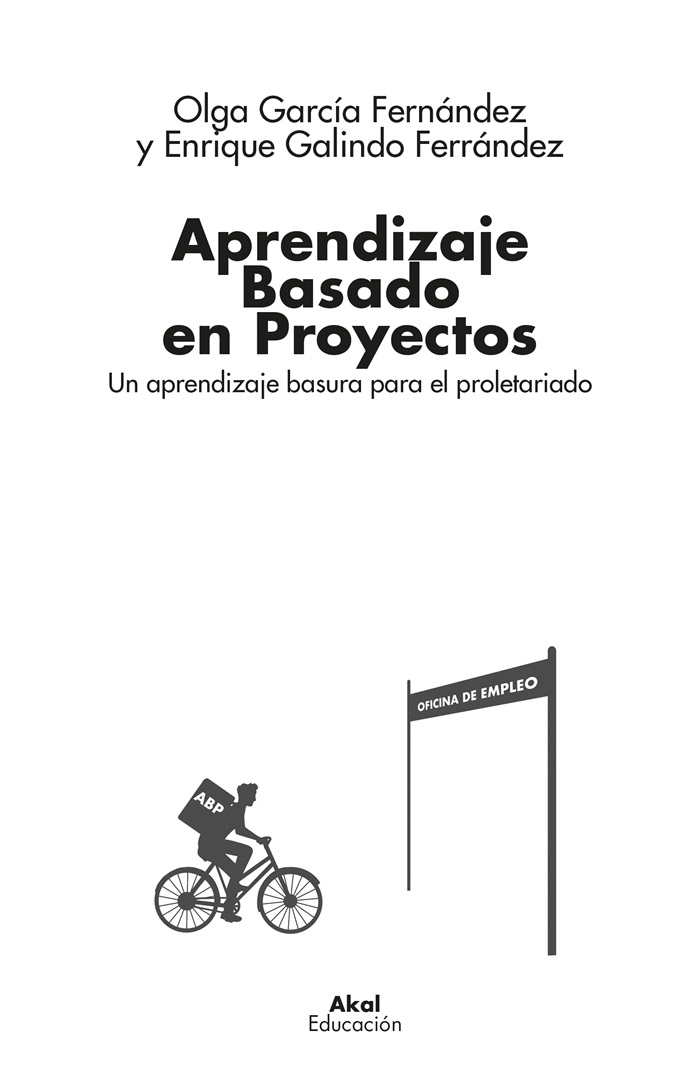- Books
- 8 de May de 2024
- No Comment
- 9 minutes read
ABP: Story of a Colossal Fraud

ABP: Story of a Colossal Fraud


Finally, the much-anticipated book Aprendizaje basado en proyectos. Un aprendizaje basura para el proletariado (Akal), by Olga García Fernández and Enrique Galindo, has arrived in the bookstores, illuminating the entire extensive political operation concealed behind the methodological enforcement of the so-called “Project-Based Learning” (PBL).
The book’s content is of paramount interest not only for educators, but also and especially for families and students concerned about the current trajectory of the public education system in our country. However, it presents a formidable challenge to review, given the pertinence, urgency, and conciseness of its content, making it very strenuous to summarise.
Perhaps the most effective approach is to allow García and Galindo to articulate the evolution of their arguments, which are manifested through the analysis of the doctrinal foundations of PBL. This include works of Kilpatrick, Dewey and their behaviourist followers, and the Spaniard Fernando Sáiz, who pioneered the implementation of this methodology in Spain in 1933. This journey transports us back to 1918.
In short, contrary to the emancipatory pedagogy promised by our legislators, PBL was a project intended to supplant our educational institutions with a neo-Taylorist corporation. “Project-Based Learning is the methodology that mirrors the collaborative work model of late 20th century and the 21st century corporations. In these corporations, individuals operate under the illusion of equality, swapping roles, and acting as pawns, leaders, and strategists for the benefit of the corporate family, where the CEO treats them as colleagues. And they do not engage in collective work per se, but rather a series of processes or strategies designed to maximise the knowledge and skills of the group members, generating a product with ‘social impact’; transferring this knowledge to other areas of the corporation or to other branches, in a diverse and ‘original’ manner, at all times, such that training, to prevent the corporation from reducing its profit margin, incurs zero cost” (p.67). In essence, this was the crux of the deception: portraying a corporate policy as a humanitarian pedagogy.
This is without even addressing the anti-pedagogical consequences, or the implications for public and mental health. PBL, in reality, subjects the human mind to a regime of continuous stress, rather than adhering to a natural understanding of the structure of the human mind. “Learning by discovery or by eternal novelty contradicts the very architecture of the human mind and overloads the functions of the human mind”; this is because each new project requires one to ‘start from scratch’. “We must understand, once and for all, that learning is nothing more and nothing less than a change in long-term memory” (p.50). Challenges and methodological anarchy cannot replace the benefits of direct instruction, which is often ridiculed in the caricatures disseminated by major media outlets, depicting monotonous teachers and passive audiences. In contrast, an active class is one that engages in confrontation, debate, verification, updating, evocation, and application of theoretical concepts. Thus, challenge-based systems lacking sufficient conceptual guidance induce, unsurprisingly, a certain degree of mental distress.
However, this is not the only surprise that the book offers: there is much more. For example, the absence of a critical pedagogical culture that acknowledges the limitations and objections noted by the defenders of PBL themselves: “Currently, all defenders of PBL, except the most radical (usually kindergarten and primary school teachers, followers of the Montessori method or the Waldorf School) have ultimately conceded that project work, regardless of its form, cannot be undertaken without a basic foundation in reading, writing, and arithmetic” (p.36).
And it is precisely here where the binary extremism of the legislators, following explicit instructions from the CEOE1, has inflicted the most damage, as it has prevented schools from rigorously addressing these three fundamental areas for the holistic development of an individual in a democracy. We are not teaching reading, writing, and arithmetic correctly. This is the barrier that separates us from a sufficient rational standardisation. Therefore, to persist in this self-interested nihilism can only signify two things: inconceivable folly or a more or less unconfessed classist ideological approach.
It turns out that those who designed the PBL had already written that it was a method especially suitable for Early Years and University stages, and not for Primary and Secondary, where the objectives were, primarily, literacy and mathematical skills. What have our legislators and organic intellectuals done? Precisely destroy the curricula of Primary and Secondary with a methodological radicalism at the service of social class indoctrination. Thus, the so-called “School of Being” has ended up becoming a culture of induced social immobility through public school, dedicated to the maintenance of a vertical social order.
In such a suggestive book, it is difficult to find fragments more representative than others, to summarize in some way the essence of such a lucid essay: “Students deserve the utmost respect, and the most basic proof of that respect is not to experiment with methodologies, fashions and practices without having the evidence, not only that they can produce a significant improvement in their learning (which would be desirable), but that they will not produce costly and irrelevant results, when not counterproductive, in some sense” (p.74). Oh, surprise! it appears that we are legislating against our most vulnerable students. How could this have happened? Hypotheses around: “In terms of the strategies employed to propagate educational trends, Marta Ferrero cites the theories of Nathalie Carrier. Two fundamental strategies exist: attractiveness and perceived credibility, which are more functional than scientific criteria such as evidence and practicality. The euphonious language, the support of marketing, and the vested dissemination by major media corporations are indispensable elements in fostering an adverse opinion about public education and a favourable current of opinion for the implementation of salvific methodologies such as PBL, serving interests unrelated to education” (p.74).
Welcome to the crucible of the cognitive precariat of today and tomorrow, in a world destined for disruptive and radical deregulation. Through the LOMLOE we have been subjected to an immense operation of social discipline, whereby the main organization of the Employers has managed to assail the academic curricula to realise its dream of manipulating new citizens in a manner fully satisfactory and adapted to their plans of economic expansion. At zero cost and seizing the opportunity to stifle any hint of future social discontent through a totalitarian and extraordinarily aggressive philosophy, based on economic absolutism, anti-intellectual utilitarian pragmatism, digital surveillance and free data trade. This is labelled progressivism, and no one apologises, while, most alarmingly, any humanist, socialist in the classical sense or, simply rational alternative is condemned to invisibility and ostracism.
Welcome to the framework of an Organic Law that is plunging us into a nightmarish social dystopia, received with applause, as Orwell wrote when he noted that new dictatorships would be established in a bloodless and even desired manner, in the name of Freedom, as is mandatory in a system predicated on Libidinal Capitalism. If this large-scale social control project does not achieve absolute success, it is because remnants of labour and social regulations still exist, and because, ultimately this economic dictatorial utopia remains inapplicable in a society that must deal with numerous other problems, not merely the culture of performance at any cost, above any hint of social and professional ethics.
___
1 Spanish Confederation of Employers’ Organizations
Book Title: Aprendizaje basado en proyectos. Un aprendizaje basura para el proletariado
Author: Olga García Fernández and Enrique Galindo
Book Editorial: Akal
Language: Spanish
Softcover: 192 pages
ISBN: 978-84-460-5480-1
Source: educational EVIDENCE
Rights: Creative Commons

